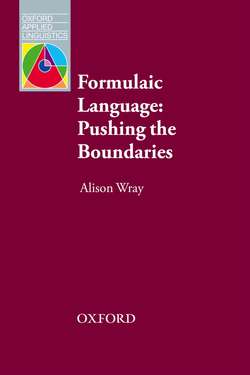Читать книгу Formulaic Language - Alison Wray - Страница 6
На сайте Литреса книга снята с продажи.
PART ONE
Determining boundaries
1
Introduction
Five questions about formulaic language
ОглавлениеThe impetus of the book is the exploration of five key questions arising from published claims about formulaic language. Each question has one or more dedicated chapters in Part Four of the book, and answers are explored with reference to the theory and data presented in the first three parts.
The first question under consideration is: Do we use formulaic language by default? If we do, it means that we attempt first to work with pre-existing multiword forms, and only move to smaller ones if it becomes necessary – very much as Sinclair (1991) proposed with his ‘idiom principle’ and ‘open choice’ principle. To what extent are our assumptions about building up utterances using words and rules just a product of our cultural conditioning? Could Biggs’ (1998) claim that the Maori language cannot be learnt other than by viewing the phrase as the base component be indicative of alternative ways of viewing what is ‘normal’? The question is addressed in Chapter 16, and Chapter 17 develops the theme of a default state for language, by asking the second key question: What determines the level of formulaicity in language? The possible origins of the default are considered, along with the dynamics determining when the default is abandoned. The effect of different individuals having different default boundaries is also considered.
The third question, addressed in Chapter 18, is: How central is formulaic language in natural language learning by humans? For instance, is formulaic language learning a viable and effective option for adults? Chapter 19 extends the theme by asking the fourth question: How central should formulaic language be when modelling such learning for computers? It explores the potential for computers to learn language without having a full set of words and rules.
The fifth and final question is addressed in Chapters 20 and 21: Does formulaic language constrain what we say and what we think? The essayist and novelist George Orwell had strong views about the capacity for formulaic language to compromise human creativity: “ready-made phrases… will construct your sentences for you – even think your thoughts for you… and at need they will perform the important service of partially concealing your meaning even from yourself” (Orwell 1946: 135). To explore the constraining potential of formulaic language, Chapter 20 looks at what happens when there is a conflict between using formulaic language to achieve something otherwise unachievable, and the limitations of not having a full range of expression. Observations about the choices available during memorization are also explored. Chapter 21 continues the exploration of how formulaic language might constrain us by looking at attempts to use it for social control, before exploring some situations in which formulaicity – albeit not in language – is apparently unavoidable.
